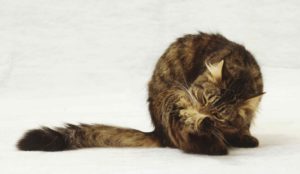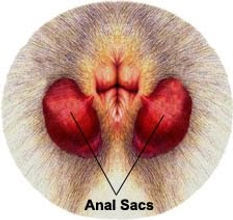Aiding Cats with Anal Gland Issues

The anal glands, sometimes called anal sacs, are two small pouches situated on either side of a cat’s anus — at approximately the four o’clock and eight o’clock positions. Both sacs’ walls are lined with sweat glands that produce and store a foul-smelling fluid that is subsequently released through small ducts located just inside the anus.
Although these distinctive secretions allowed our domesticated cats’ ancestors to mark their territory and ward off predators, they serve little purpose today. And while small amounts of this fluid are released whenever cats defecate, some cats may actually release or “express” the entire contents of their anal glands when they’re either excited or frightened.
Whereas diseases of the anal glands are more common in dogs, they also appear in cats, and can include impaction, abscesses, ruptures and, in rare instances, tumors.
Impaction occurs when the duct leading from the anal gland to the anus becomes clogged, and as it fills up with an ever-thickening liquid, the gland becomes distended. As the gland distends, the pressure inside of it increases, causing the affected kitty extreme discomfort. The most common signs that your kitty’s anal gland is impacted include: excessive licking and cleaning of her anal area; a reluctance to sit; a reluctance to defecate; holding her tail in an unusual position, and “scooting” or dragging her anus along the carpet or floor. Should your cat be exhibiting any or several of these signs, bring her to the vet and have her anal glands expressed manually. This simple procedure will swiftly relieve the pressure inside the gland, thereby re-opening the clogged duct.
Sometimes, however, the first sign that a kitty’s in pain occurs when the anal gland’s impacted secretions become infected. This causes pus to accumulate inside the gland, and the result is an abscess. If the pus can’t pass through the duct leading from the gland towards the anus, it will simply “burrow” through the skin around the anus. In some cases, the pus will actually burst through the skin, draining out on its own.
If an anal gland ruptures, it often causes severe skin damage to the affected area. In order to treat it, your vet will typically anesthetize your cat and then thoroughly cleanse and surgically trim and/or remove all of the damaged skin. To reduce the size of the wound and promote faster healing, several stitches may be required. If, on the other hand, an abscess is diagnosed before the gland ruptures, your vet will lightly sedate or fully anesthetize your cat, lance the abscess and prescribe a course of antibiotics for her.
If your cat suffers from recurrent anal gland problems, she may benefit from a high-fiber diet. The added fiber helps to produce bulkier stools which, in turn, increases the pressure on her anal glands when she defecates and allows them to be expressed more efficiently.
Because overweight cats are more prone to anal gland disorders, keep your own cat at a healthy weight to help reduce her chances of incurring these problems. On rare occasions, cats suffering from repeated impactions and/or abscesses may need to have their anal glands surgically removed.
Cancer of the anal glands, or anal gland adenocarcinoma, is, thankfully, uncommon in cats. Its symptoms often mimic those of an anal gland abscess, such as bleeding, inflammation, pain, swelling and ulceration of the skin around the anus. While the preferred treatment is surgically removing the cancerous anal gland, these tumors tend to be aggressive, and by the time a diagnosis is made, the cancer, sadly, has often spread to other parts of the cat’s body.



